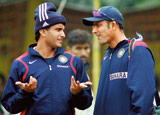The world of cricket is agog: the new masters of the game in India have bared their commercial agenda, and the reaction to it has been a mixture of awe, fear, anxiety and excitement. Superpowers are rarely known to be egalitarian, and the Indian board is making no apologies about its ambition: it wants to leverage the size of its television market to maximise its earnings and is prepared, almost brazenly, to shake up world cricket for it.
The question is, how far will India go, and where will that lead world cricket? Here's the worst-case scenario: the international cricket calendar, as drawn up by the ICC and agreed to by the member nations, will collapse; the ICC will be rendered powerless and superfluous; cricket will become more insular and elitist; weaker countries will find themselves marginalised and isolated; and bereft of the ICC's resources and leadership, development programmes in these countries will be derailed. These are legitimate concerns. For the sake of the game, India's prosperity cannot be at the cost of world cricket. In any case, such prosperity is doomed to be short-lived.
But despite the blatantly predatory ring there is a veneer of legitimacy to the Indian position, and despite the unilateralism it smacks of, there is a possibility that some good will emerge out of it. Allowing for the bluster and posturing normally associated with hard bargains, a compromise of sorts is inevitable; if everyone plays their cards right, world cricket just might benefit.
India's blunt withdrawal from the Champions Trophy is seen as a direct assault on the authority of the ICC. But the Champions Trophy - the brainchild, ironically, of Jagmohan Dalmiya, to whom the ICC owes its nose for money - has grown to be an unwieldy and unsatisfactory tournament, consuming large chunks of time and producing some gross mismatches. India's major gripe is about the timing of the Champions Trophy, which more often than not eats into India's home season and provides very little commercial benefit in return. Would England agree to spend three weeks playing an ICC tournament in July or Australia one in December, the Indian administrators ask. No tears should be shed if India's tough stand forces a rethink on the viability of a tournament that has been anything but a champions trophy.
The ICC's Future Tours Programme too was crying out for an overhaul. It mandated that every nation play every other nation four times in the space of 10 years, effectively making a mockery of Test cricket since a large number of those matches would involve Bangladesh and Zimbabwe. To retain its relevance and to ensure it stays the supreme form of the game, Test cricket needs to be played between teams that can sustain a competition over five days. India's suggestion that top teams play each other more frequently isn't as pernicious as some make it out to be, even if it is wholly self-serving.
But at the same time, to be taken seriously as a leader, India must learn to behave like one. It is justified in seeking to redress the imbalance in the international calendar, which it finds discriminatory and inimical to its interests, but it must assure the international cricket community that it is prepared to think beyond itself and put its might behind causes that transcend commerce. That sport is big business today is an inescapable reality. But it must not be lost on anyone that there is a fundamental difference between sport and business. Money may be sport's biggest driver, but it is not its soul; cricket needs to make money in order to exist, but it doesn't exist to make money.

